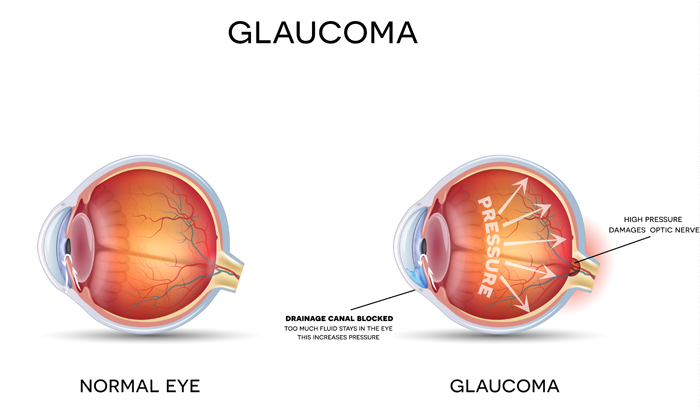GLAUCOMA Treatment in Koramangala, Bangalore
INTRODUCTION -
Glaucoma refers to a disease that affects the optic nerve in your eyes. This disease damages the optic nerve in your eyes because of the increased pressure created due to extra fluid building up in your eyes. This disease gets worse over time and may lead to vision loss or even blindness. There is no cure for glaucoma, but you can slow or even stop its development with the best treatment.

TYPES OF GLAUCOMA -
Glaucoma can be of different types as mentioned below:-
- Chronic Glaucoma - Chronic glaucoma, also known as Open-angle Glaucoma, is the most common type of glaucoma disease. This type of glaucoma disease does not show any signs or symptoms except for gradual vision loss. The frequency of this type of glaucoma disease increases with age.
- Acute Glaucoma - Acute Glaucoma, also known as Angle-Closure Glaucoma, is extremely common in Asian countries. In acute glaucoma, it becomes difficult for the excess fluid to drain from the eye because the area between the iris of your eye and cornea becomes very narrow. Acute glaucoma is generally considered an emergency that needs to be looked after at the earliest.
- Secondary Glaucoma - Another type of glaucoma is the not-so-common Secondary Glaucoma. It generally occurs as a side effect of other types of eye diseases or conditions like cataracts, diabetes, etc. Due to these side effects, extra pressure is added to the eye, sometimes leading to chronic glaucoma.
- Normal-Tension Glaucoma - Another type of glaucoma disease is Normal-Tension Glaucoma, which often occurs when there are blind spots in your vision. This condition of glaucoma occurs when your optic nerve is damaged even if the eye pressure is normal. The reason for optic nerve damage can be a lack of blood flow to your optic nerve.
SYMPTOMS OF GLAUCOMA -
Some of the symptoms or signs of glaucoma are:-
- Gradual loss of vision, often in both eyes.
- Constricted / tunnel vision.
- Experiencing severe pain in your eyes.
- Reddening of eyes.
- Suffering from nausea or vomiting.
- Hazy eyes.
- Seeing halos like circles around lights.
If you notice mild symptoms of glaucoma, you should immediately schedule your appointment with healthcare professionals at the earliest.
Request an appointment at Apollo Hospitals
Call 1860 500 2244 to book an appointment
CAUSES OF GLAUCOMA -
For the proper working of your eyes, a fluid called aqueous humor usually flows out of your eyes from a grid-like structure behind the cornea. But when this channel gets blocked, or the eye starts producing too much fluid, aqueous humor starts building up. The cause of this structure blockage is still unknown, but according to experts, this condition can be hereditary. Due to the blockage of this grid-like structure, the fluid (aqueous humor) gathers, thus increasing the pressure on your cornea and resulting in glaucoma.
DIAGNOSIS OF GLAUCOMA -
The diagnosis of glaucoma is relatively painless and efficient. It does not take doctors very long to test your vision. Like every other eye test, doctors use drops to dilate your pupil and properly test your vision along with the optic nerve damage, if any.
TREATMENT OF GLAUCOMA -
Glaucoma is not entirely curable, but we can slow down or even stop the disease’s progression with proper treatment.
The treatment of glaucoma includes -
- EYE DROPS - Using eye drops is the initial step of your treatment. These drops are prescribed by the doctor to improve the draining process of the fluid in your eyes.
- MEDICATIONS - If needed, oral medications are also prescribed by doctors to treat glaucoma.
- SURGERY - If you do not find relief by using the prescribed drops and medications, doctors may suggest surgery to reduce the pressure and help slow down glaucoma.
While everyone is at risk of glaucoma, some are more at risk than others. These include people above 45, people with a family history of glaucoma, diabetic patients, and people with other eye diseases.
We cannot prevent glaucoma, but an early diagnosis of the condition is still needed for proper treatment to prevent it from worsening with time.
If not diagnosed on time, glaucoma can result in complete blindness for a patient. Still, with proper diagnosis and treatment, vision loss can be prevented from worsening.
Symptoms
Our Doctors
DR. SHALINI SHETTY
MBBS, MS (Ophthalmol...
| Experience | : | 30 Yeras Experience |
|---|---|---|
| Speciality | : | Ophthalmology... | Location | : | Koramangala |
| Timings | : | Available by prior a... |
Our Top Specialities
NOTICE BOARD
CONTACT US
CONTACT US
 Book Appointment
Book Appointment



.svg)
.svg)
.svg)
.svg)








